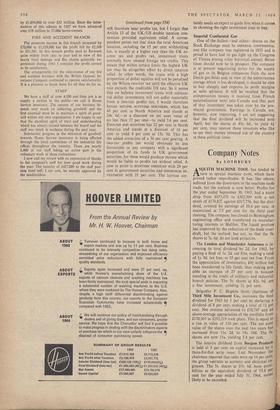Company Notes
By LOTHBURY ASQUITH MACHINE TOOL has tended to turn to special machine tools, which have proved rather unprofitable. It has, like others, suffered from the down-turn in the machine tools trade, but the outlook is now better. Profits for the year ended September 30, 1963, had a nasty drop from £675,476 to £362,509 with a net result of £176,827 against £317,756, but the divi- dend, covered by earnings of 10.4 per cent, is maintained at 7.5 per cent for the third year running. The company has closed its Birmingham engineering office and transferred its manufac- turing interests to Halifax. The liquid position has improved by the reduction of the bank over- draft, but the outlook has not, so that the 5s. shares at 7s. 6d. do not look attractive.
The London and Manchester Assurance is in- creasing its total dividend by 2d. for 1963, by paying a final of Is. 2d. tax free, making a total of Is. 9d. tax free, or 35 per cent tax free. From the appreciation of investments, £4f million has been transferred to life funds, thus making pos- sible an increase of 25 per cent in bonuses standing to the credit of ordinary and industrial branch policies. The 5s. shares a_t 82s. 9d. are a fine investment, yielding 34 per cent.
Brigadier F. C. Hopton Scott, chairman of Third Mile Investment Co., increases the final dividend for 1963 by 1 per cent by declaring a dividend of 8 per cent, making a total of 12 per cent. Net revenue advanced to £18,747 and all above-average appreciation of the portfolio from £170,305 to £292,519 took place. This is equal to a rise in value of 110 per cent. The net asset value of the shares over the past two years has increased from Ifs. 2d. to 14s. 10d. The 5s. shares are now Ifs, yielding 5.4 per cent.
The interim dividend from Burgess Products is held at 5 per cent on capital increased by 3 three-for-five scrip issue. Last November the chairman reported that sales were up 14 per cent; the group operates as acoustic and electrical en- gineers. The 5s. shares at 37s. 6d. have possi- bilities as the equivalent dividend pf 15.4 Per cent for the year ended July 31, 1964, seems likely to be exceeded.


































 Previous page
Previous page